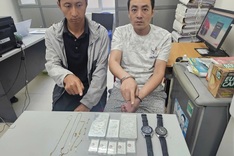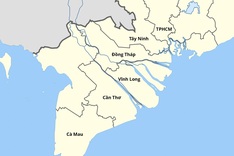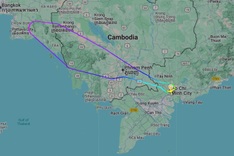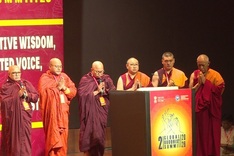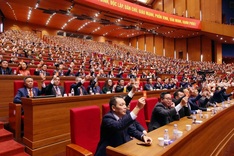Japan's Finance Minister Naoto Kan was widely tipped to become prime minister of the world's second-largest economy Friday after his predecessor bowed out over the bungled handling of a US base dispute.
 |
| Japan's Finance Minister Naoto Kan is set to become prime minister of the world's second-largest economy, after his predecessor bowed out over the bungled handling of a US base dispute. (AFP/File/Kazuhiro Nogi) |
If the leadership vote follows expectations, Kan will take over from Yukio Hatoyama, who formally stepped down with his cabinet Friday after a tearful resignation speech Wednesday in which he also apologised for money scandals.
Kan, a 63-year-old former civic activist, was also deputy prime minister in the centre-left government that came to power last year in a landslide election victory that ended over half a century of almost non-stop conservative rule.
Despite a late challenge, Kan hoped he would succeed Hatoyama, first as president of the Democratic Party of Japan (DPJ) and then, after a parliamentary vote starting 0500 GMT, as Japan's prime minister.
Later in the day, the new premier may announce the cabinet which, under Kan, would likely retain many of Hatoyama's ministers, including Foreign Minister Katsuya Okada, a potential rival who backed Kan's candidacy.
"Many people entrusted the DPJ with a torch, to rebuild Japan," Kan said on the eve of the vote Thursday, confirming his candidacy. "I want to carry on the torch from Prime Minister Hatoyama and realise that goal."
He said his priorities would be to revive the lacklustre economy, restore confidence in his party and root out money politics that have caused scandals for Hatoyama, who received undeclared funds from his millionaire mother.
Kan, the son of a factory manager and a graduate of applied sciences from a top university, in the 1970s campaigned for pacifist and environmental causes and entered parliament with a leftist party in 1980.
His party disbanded, and he later co-founded the DPJ with Hatoyama, gaining popularity in the mid-1990s when as health minister he admitted government culpability in a scandal over HIV-tainted blood products.
He took a central role when the DPJ took power last September, becoming deputy premier and heading a new National Strategy Bureau, tasked with wresting power from Japan's entrenched and secretive state bureaucracy.
In January Kan, although not a trained economist, took over as finance minister. In the post he has advocated a weaker yen and badgered the central bank to do more to help recovery from Japan's worst post-war recession.
He has also pushed for fiscal austerity and tax rises to reduce a ballooning public deficit nearing 200 percent of gross domestic product.
Most media named Kan as frontrunner shortly after Hatoyama stepped aside.
However, what began as a virtual one-horse-race turned into a contest after a relative unknown declared his candidacy, the Osaka lawmaker Shinji Tarutoko, 50, chairman of the party's environment committee.
Public broadcaster NHK reported that Tarutoko had received the backing of lawmakers close to Ichiro Ozawa, the just-resigned secretary general, a veteran backroom fixer sometimes dubbed the "Shadow Shogun".
Ozawa's party faction includes about 150 of the party's 423 lawmakers.
Kan on Thursday said of Ozawa, who stood down with Hatoyama over a political funding scandal, that "I think it would be better for himself, the Japanese people and the party if he stays quiet at least for a while."
With only weeks to go for an upper house election expected on July 11, Japan's next premier must quickly rebuild trust in a government whose cabinet approval rating had in recent weeks dropped below 20 percent.
Hatoyama's support plummeted after he backtracked on an election promise to move an unpopular US air base off the island of Okinawa, enraging people there as well as the pacifist Social Democrats, who quit the ruling coalition.
The row badly damaged Tokyo's relations with Washington, which has been Japan's bedrock security ally since the end of World War II.
Hatoyama said in his resignation statement that despite his best intentions "we have decided to step down half-way through. It was extremely regrettable and I am deeply sorry for the failure to fulfill our promises to the people".

